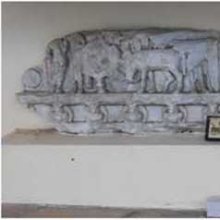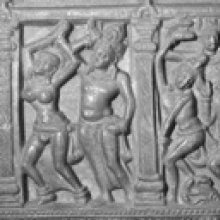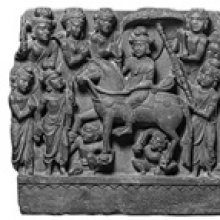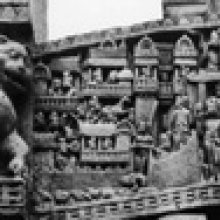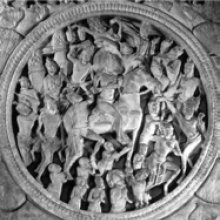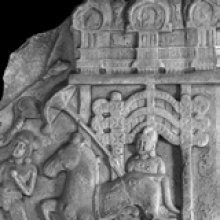Kanthaka, Kaṇṭhaka, Kamthaka: 11 definitions
Introduction:
Kanthaka means something in Buddhism, Pali, Hinduism, Sanskrit, Marathi, Jainism, Prakrit. If you want to know the exact meaning, history, etymology or English translation of this term then check out the descriptions on this page. Add your comment or reference to a book if you want to contribute to this summary article.
Images (photo gallery)
(+1 more images available)
In Hinduism
Kavya (poetry)
Source: academia.edu: Bhoja’s Mechanical GardenKaṇṭhaka (कण्ठक) is the name of Buddha’s horse, a statue of whom was used to hide his relics, as mentioned in the 12th century Lokapaññati (“description of the world”), a Pali text from Burma.—[...] King Ajātasattu (Sanskrit: Ajātaśatru) of Pāṭaliputta used a collection of sword-wielding automata to guard a secret place where he enshrined the relics of the Buddha in the belly of a statue of the Buddha’s horse Kaṇṭhaka. But after his death, the location of the relic shrine became lost. Later, the king’s descendant the famous Emperor Asoka became aware of a prophecy that he would become a righteous world ruler (cakkavattin) over Jambudīpa and that he would take the relics of the Buddha’s body and with them build 84,000 stūpas. [...]
Asoka is led to this mound [where the statue of Kaṇṭhaka was situated] and had his men dig it up, revealing a succession of roofs built over a circular enclosure in which was located a beautiful temple covered in gems and surrounded by seven walls. It was guarded by a multitude of automata that circled the area assailing everything within their reach in order to protect the relics. [...] The son of the artisan who had brought the technology from Roma, who was still alive, came forward. Asoka ordered him to dismantle the automata, which he did. Asoka then entered the precincts of the temple and arrived at its sanctum and the statue of Kaṇṭhaka. After circumambulating it three times, a mechanical door in the statue opened revealing a box in which a relic shone like a diamond. Asoka and his courtiers worshiped it and enshrined it in a temple.

Kavya (काव्य, kavya) refers to Sanskrit poetry, a popular ancient Indian tradition of literature. There have been many Sanskrit poets over the ages, hailing from ancient India and beyond. This topic includes mahakavya, or ‘epic poetry’ and natya, or ‘dramatic poetry’.
In Buddhism
Theravada (major branch of Buddhism)
Source: Pali Kanon: Pali Proper NamesThe horse on which Gotama left his fathers palace, accompanied by his attendant Channa. It is said that when Kanthaka was saddled for the journey, he realised the importance of the hour and neighed loudly for joy, but the gods muffled the sound of his neighing as also that of his footsteps as he galloped through the streets; ordinarily the sound of his neighing and galloping could be heard throughout Kapilavatthu. He was eighteen cubits long from neck to tail and proportionately broad, quite white in colour, like a clean conch shell.
In this journey of Gotama, Channa held on to Kanthakas tail. The horse had the strength, had it been necessary, to clear the ramparts of the city, eighteen hands high, at one bound, with the prince and Channa on his back. Just outside Kapilavatthu the prince stopped the horse, in order to take a last look at the city. A cetiya was later erected on this spot and called Kanthakanivatta cetiya. The horse travelled thirty leagues between midnight and the following morning, as far as the river Anoma. It is said that Kanthaka could travel round the whole cakka vala in one night. With one leap the horse cleared the river, which was eight fathoms wide. On arriving on the opposite bank, the Bodhisatta gave orders that Kanthaka should be taken back to Kapilavatthu, but Kanthaka kept looking back at his master, and when the Bodhisatta disappeared from view the horse died of a broken heart, and was reborn in Tavatimsa under the name of Kanthaka devaputta. (J.i.62-5; Mtu.ii.159f., 165, 189, 190; VibhA.34, etc.; Buddhacarita, v.3, 68; vi.53ff).
Kanthaka was born on the same day as the Bodhisatta (J.i.54; BuA.106, 234, etc.). In heaven he had a magnificent palace of veluriya gems, which Moggallana visited on one of his tours in Tavatimsa. (Vv.73f;-VVA.311-18; see also DhA.i.70; iii.195).
-- or --
See Kanthaka.
Theravāda is a major branch of Buddhism having the the Pali canon (tipitaka) as their canonical literature, which includes the vinaya-pitaka (monastic rules), the sutta-pitaka (Buddhist sermons) and the abhidhamma-pitaka (philosophy and psychology).
Languages of India and abroad
Pali-English dictionary
Source: Sutta: The Pali Text Society's Pali-English Dictionary1) Kaṇṭhaka, 2 N. of Gotama’s horse, on which he left his father’s palace Mhbv 25; spelt kanthaka at J. I, 54, 62 sq. (Page 179)
2) Kaṇṭhaka, 1 thorn, see kaṇṭaka. (Page 179)

Pali is the language of the Tipiṭaka, which is the sacred canon of Theravāda Buddhism and contains much of the Buddha’s speech. Closeley related to Sanskrit, both languages are used interchangeably between religions.
Marathi-English dictionary
Source: DDSA: The Molesworth Marathi and English Dictionarykaṇṭhaka (कंठक).—a (kaṇṭhaṇēṃ) Possessed of fortitude, enduring, patient.
Source: DDSA: The Aryabhusan school dictionary, Marathi-Englishkaṇṭhaka (कंठक).—a Possessed of fortitude, enduring.
Marathi is an Indo-European language having over 70 million native speakers people in (predominantly) Maharashtra India. Marathi, like many other Indo-Aryan languages, evolved from early forms of Prakrit, which itself is a subset of Sanskrit, one of the most ancient languages of the world.
Sanskrit dictionary
Source: Cologne Digital Sanskrit Dictionaries: Edgerton Buddhist Hybrid Sanskrit DictionaryKaṇṭhaka (कण्ठक).—m. (1) as in Pali, alternative spelling for kaṇṭaka, thorn: Saddharmapuṇḍarīka 420.4; Mahāvastu i.91.16; Divyāvadāna 350.8 °kān uddharati; see also next, and pṛṣṭhi-kaṇṭhaka; (2) name of the Bodhisattva's horse (here as in Pali also Kanthaka, but rarely): Kaṇṭh° Mahāvastu i.154.6 ff.; ii.114.14; 159.13 ff.; 189.2 ff.; iii.120.4; 262.5; dies mourning for the B.'s departure, ii.190.9, and is reborn as a god of the same name, 11; Lalitavistara 94.14; 95.11; 217.11; 221.8; 225.8 ff.; 228.17 ff.; spelling Kanthaka noted only Mahāvyutpatti 4772.
--- OR ---
Kanthaka (कन्थक).—see Kaṇṭhaka (2).
Source: Cologne Digital Sanskrit Dictionaries: Monier-Williams Sanskrit-English Dictionary1) Kaṇṭhaka (कण्ठक):—[from kaṇṭha] m. an ornament for the neck, [Kathāsaritsāgara]
2) [v.s. ...] Name of the horse of Śākyamuni, [Lalita-vistara]
3) Kanthaka (कन्थक):—m. Name of a man [gana] gargādi, [Pāṇini 4-1, 105]
4) (= kaṇṭhaka) Buddha’s horse, [Buddha-carita]
5) Kanthakā (कन्थका):—[from kanthaka] f. a species of Opuntia, [cf. Lexicographers, esp. such as amarasiṃha, halāyudha, hemacandra, etc.]
6) Kānthaka (कान्थक):—n. ‘coming from the town Kanthā’, a particular substance, [Pāṇini 4-2, 103.]
Source: DDSA: Paia-sadda-mahannavo; a comprehensive Prakrit Hindi dictionary (S)Kaṇṭhaka (कण्ठक) in the Sanskrit language is related to the Prakrit words: Kaṃṭhaya, Kaṃthaka, Kathaṃga, Kaṃthaya.
[Sanskrit to German]
Sanskrit, also spelled संस्कृतम् (saṃskṛtam), is an ancient language of India commonly seen as the grandmother of the Indo-European language family (even English!). Closely allied with Prakrit and Pali, Sanskrit is more exhaustive in both grammar and terms and has the most extensive collection of literature in the world, greatly surpassing its sister-languages Greek and Latin.
Prakrit-English dictionary
Source: DDSA: Paia-sadda-mahannavo; a comprehensive Prakrit Hindi dictionaryKaṃthaka (कंथक) in the Prakrit language is related to the Sanskrit word: Kanthaka.
Kaṃthaka has the following synonyms: Kathaṃga, Kaṃthaya.
Prakrit is an ancient language closely associated with both Pali and Sanskrit. Jain literature is often composed in this language or sub-dialects, such as the Agamas and their commentaries which are written in Ardhamagadhi and Maharashtri Prakrit. The earliest extant texts can be dated to as early as the 4th century BCE although core portions might be older.
See also (Relevant definitions)
Starts with (+1): Kamthakamthi, Kantakacinturam, Kantakakkalappiyam, Kantakam, Kantakamalai, Kantakapasanam, Kantakappirakam, Kantakappu, Kantakaracayanam, Kantakatailam, Kantakatpalam, Kantakaviraippatu, Kantakavuppu, Kanthakala, Kanthakamugu, Kanthakanivatta Cetiya, Kanthakapashraya, Kanthakari, Kanthakarkashya, Kanthakarni.
Ends with (+3): Astrakanthaka, Bhrijjakanthaka, Bhurjakanthaka, Bhurjjakanthaka, Dirghakanthaka, Gokanthaka, Kalakanthaka, Karakanthaka, Krikanthaka, Kshirakanthaka, Manikanthaka, Nikanthaka, Nilakanthaka, Prakanthaka, Prishthakanthaka, Sahakanthaka, Shitikanthaka, Shrikanthaka, Shuklakanthaka, Trikanthaka.
Full-text (+25): Kanthakya, Dirghakanthaka, Shuklakanthaka, Kalakanthaka, Kamthaya, Kanthika, Kathanga, Manikanthaka, Kshirakanthaka, Kanthakanivatta Cetiya, Kanthakasala Parivena, Kantharika, Kanthari, Prishthakantaka, Astrakanthaka, Karakanthaka, Urdhvakanthaka, Shitikanthaka, Sahakanthaka, Dirghakamdhara.
Relevant text
Search found 18 books and stories containing Kanthaka, Kaṇṭhaka, Kanthakā, Kānthaka, Kamthaka, Kaṃthaka; (plurals include: Kanthakas, Kaṇṭhakas, Kanthakās, Kānthakas, Kamthakas, Kaṃthakas). You can also click to the full overview containing English textual excerpts. Below are direct links for the most relevant articles:
Amaravati Art in the Context of Andhra Archaeology (by Sreyashi Ray chowdhuri)
The Great Departure or Mahābhiniṣkramaṇa < [Chapter 3 - Amarāvatī and the Formative Stage of the Buddhist Art]
Parasol or Chatra < [Chapter 3 - Amarāvatī and the Formative Stage of the Buddhist Art]
Making of a Monk and practice of Austerities < [Chapter 3 - Amarāvatī and the Formative Stage of the Buddhist Art]
Apadana commentary (Atthakatha) (by U Lu Pe Win)
Prince Siddhartha Renounces Worldly Life and Becomes Hermit < [Part 2 - Discourse on the non-remote preface (avidūre-nidāna)]
Commentary on Biography of the thera Kāḷudāyī < [Chapter 4 - Kuṇḍadhānavagga (section on Kuṇḍadhāna)]
Birth of Prince Siddhartha, the Future Gotama Buddha < [Part 2 - Discourse on the non-remote preface (avidūre-nidāna)]
Garga Samhita (English) (by Danavir Goswami)
Verse 5.24.95 < [Chapter 24 - The Killing of the Kola Demon]
A Record of Buddhistic Kingdoms (by Fa-Hien)
The Mahavastu (great story) (by J. J. Jones)
Chapter XIX - Gotama’s early wanderings < [Volume II]
Chapter XVI - The great renunciation again < [Volume II]
Chapter XVII - The tenth Bhūmi < [Volume I]
Maha Prajnaparamita Sastra (by Gelongma Karma Migme Chödrön)
III. The procession to bodhi < [Part 10 - Looking in the manner of the elephant, etc.]
Bhūmi 9: the ground of good wisdom (sādhumatī) < [Chapter XX - (2nd series): Setting out on the Mahāyāna]
Part 1 - For what reasons did the Buddha preach Mahāprajñāpāramitāsūtra? < [Chapter I - Explanation of Arguments]
